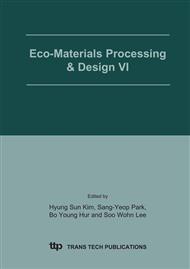p.245
p.249
p.253
p.257
p.261
p.265
p.269
p.273
p.277
Effect of Skin Pass Mill Elongation on Characteristics of Surface Friction and Formability
Abstract:
Coated sheet steels have been increasingly used in automotive industry for improving corrosion resistance. When GA outer plates processed the interfacing of the coating film and the metal matrix causes surface irregularities in the surface state of the sheet metal. Consequently, research to determine each phase composite’s friction coefficient is on-going. Investigating the effects that cause surface roughness, change and mechanical properties of outer automobile plates through temper rolling skin pass mill elongation is essential. Researching surface roughness in relation to surface friction properties requires the determination of a surface friction coefficient. This research demonstrates that there is a complex effect between the lubricant membrane and surface roughness when processing GA plates. Consequently, the strength of the lubricant membrane strongly influences the friction coefficient
Info:
Periodical:
Pages:
261-264
Citation:
Online since:
June 2005
Authors:
Price:
Сopyright:
© 2005 Trans Tech Publications Ltd. All Rights Reserved
Share:
Citation:


